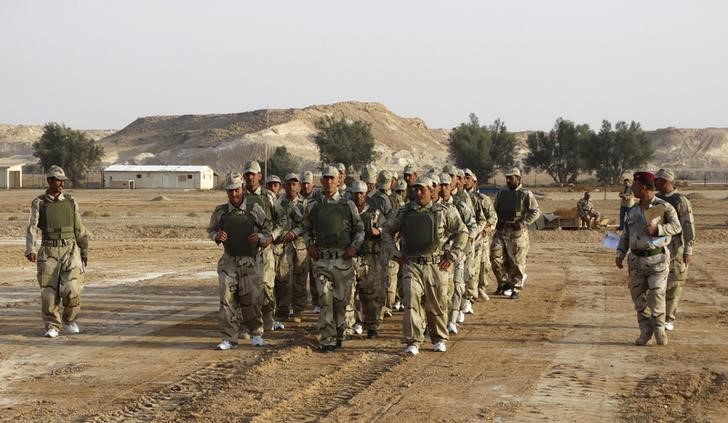By David Alexander
WASHINGTON (Reuters) - U.S. troops have started training Iraqi military forces at two bases in Iraq as they work to build a force that can take the offensive against Islamic State militants who overran part of the country last year, the Pentagon said on Monday.
About 320 U.S. Marines are training members of the Iraqi 7th Division at Ain al-Asad air base in western al Anbar province, which is taking regular harassing mortar fire from Islamic State militants, said Army Colonel Steve Warren, a Pentagon spokesman. The training began on Dec. 20.
Another 170 U.S. troops, soldiers of the Army's 1st Infantry Division, began a six-week training course for four battalions of Iraqi security forces on Dec. 27 in Taji, a predominantly Sunni rural area north of Baghdad, Warren said.
President Barack Obama announced plans on Nov. 7 to roughly double the number of U.S. troops in Iraq to more than 3,000, adding the additional 1,500 military personnel to train nine Iraqi military brigades and three Kurdish peshmerga brigades.
The decision came at the recommendation of U.S. military assessment teams deployed to Iraq to evaluate conditions and needs after Islamic State militants overran much of the northwestern part of the country.
The United States had about 2,140 military personnel in Iraq as of Jan. 4, with about 800 of those protecting U.S. personnel and facilities and the remaining 1,340 advising Iraqi forces fighting Islamic State militants or training Iraqi troops, Warren said.
U.S. forces also are planning to train Iraqi military personnel at bases in Arbil in the Kurdish region as well as Besmaya south of Baghdad, the site of a combat centre that trained many Iraqi troops.
"We don't expect either of those to be up and running for several more weeks," Warren told reporters at a briefing.
Warren said the Marines at al Asad base in Anbar province were primarily assisting Iraqis with "mission support planning, information and intelligence fusion, close air support coordination operations and overall development of security strategies."
He said Asad was "coming under regular ... harassment fire" from Islamic State militants, describing them as "purely nuisance attacks" using indirect weapons like mortars.

"The fire has been completely ineffective ... The Iraqi security forces there have done a very good job of creating a security zone. American forces ... have sustained absolutely no injuries, wounds or even a close attack," he said.
(Editing by Lisa Shumaker)